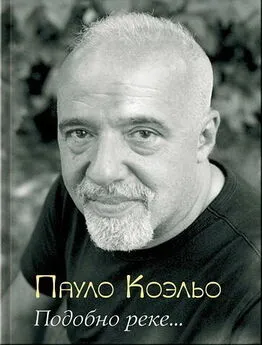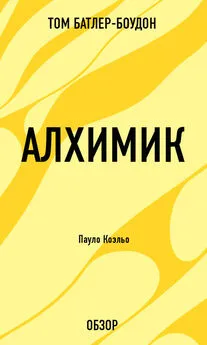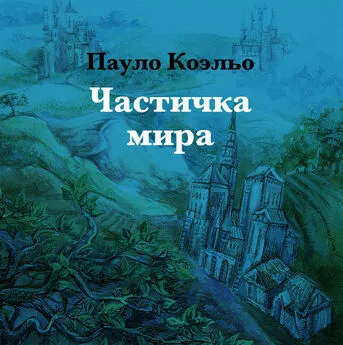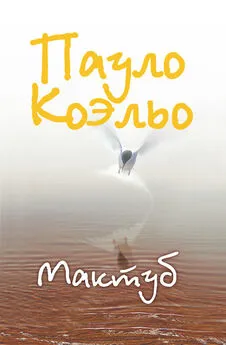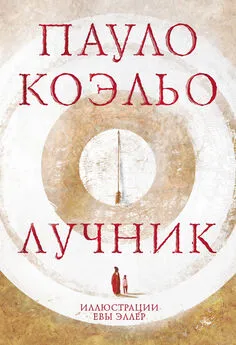Пауло Коэльо - The Alchemist
- Название:The Alchemist
- Автор:
- Жанр:
- Издательство:неизвестно
- Год:неизвестен
- ISBN:нет данных
- Рейтинг:
- Избранное:Добавить в избранное
-
Отзывы:
-
Ваша оценка:
Пауло Коэльо - The Alchemist краткое содержание
The Alchemist - читать онлайн бесплатно полную версию (весь текст целиком)
Интервал:
Закладка:
The Englishman was unable to sleep one night. He called to the boy, and they took a walk along the dunes surrounding the encampment. There was a full moon, and the boy told the Englishman the story of his life.
The Englishman was fascinated with the part about the progress achieved at the crystal shop after the boy began working there.
"That's the principle that governs all things," he said. "In alchemy, it's called the Soul of the World. When you want something with all your heart, that's when you are closest to the Soul of the World. It's always a positive force."
He also said that this was not just a human gift, that everything on the face of the earth had a soul, whether mineral, vegetable, or animal—or even just a simple thought.
"Everything on earth is being continuously transformed, because the earth is alive… and it has a soul. We are part of that soul, so we rarely recognize that it is working for us. But in the crystal shop you probably realized that even the glasses were collaborating in your success."
The boy thought about that for a while as he looked at the moon and the bleached sands. "I have watched the caravan as it crossed the desert," he said. "The caravan and the desert speak the same language, and it's for that reason that the desert allows the crossing. It's going to test the caravan's every step to see if it's in time, and, if it is, we will make it to the oasis."
"If either of us had joined this caravan based only on personal courage, but without understanding that language, this journey would have been much more difficult."
They stood there looking at the moon.
"That's the magic of omens," said the boy. "I've seen how the guides read the signs of the desert, and how the soul of the caravan speaks to the soul of the desert."
The Englishman said, "I'd better pay more attention to the caravan."
"And I'd better read your books," said the boy.
*
They were strange books. They spoke about mercury, salt, dragons, and kings, and he didn't understand any of it. But there was one idea that seemed to repeat itself throughout all the books: all things are the manifestation of one thing only.
In one of the books he learned that the most important text in the literature of alchemy contained only a few lines, and had been inscribed on the surface of an emerald.
"It's the Emerald Tablet," said the Englishman, proud that he might teach something to the boy.
"Well, then, why do we need all these books?" the boy asked.
"So that we can understand those few lines," the Englishman answered, without appearing really to believe what he had said.
The book that most interested the boy told the stories of the famous alchemists. They were men who had dedicated their entire lives to the purification of metals in their laboratories; they believed that, if a metal were heated for many years, it would free itself of all its individual properties, and what was left would be the Soul of the World. This Soul of the World allowed them to understand anything on the face of the earth, because it was the language with which all things communicated. They called that discovery the Master Work—it was part liquid and part solid.
"Can't you just observe men and omens in order to understand the language?" the boy asked.
"You have a mania for simplifying everything," answered the Englishman, irritated. "Alchemy is a serious discipline. Every step has to be followed exactly as it was followed by the masters."
The boy learned that the liquid part of the Master Work was called the Elixir of Life, and that it cured all illnesses; it also kept the alchemist from growing old. And the solid part was called the Philosopher's Stone.
"It's not easy to find the Philosopher's Stone," said the Englishman. "The alchemists spent years in their laboratories, observing the fire that purified the metals. They spent so much time close to the fire that gradually they gave up the vanities of the world. They discovered that the purification of the metals had led to a purification of themselves."
The boy thought about the crystal merchant. He had said that it was a good thing for the boy to clean the crystal pieces, so that he could free himself from negative thoughts. The boy was becoming more and more convinced that alchemy could be learned in one's daily life.
"Also," said the Englishman, "the Philosopher's Stone has a fascinating property. A small sliver of the stone can transform large quantities of metal into gold."
Having heard that, the boy became even more interested in alchemy. He thought that, with some patience, he'd be able to transform everything into gold. He read the lives of the various people who had succeeded in doing so: Helv?ius, Elias, Fulcanelli, and Geber. They were fascinating stories: each of them lived out his destiny to the end. They traveled, spoke with wise men, performed miracles for the incredulous, and owned the Philosopher's Stone and the Elixir of Life.
But when the boy wanted to learn how to achieve the Master Work, he became completely lost. There were just drawings, coded instructions, and obscure texts.
*
"Why do they make things so complicated?" he asked the Englishman one night. The boy had noticed that the Englishman was irritable, and missed his books.
"So that those who have the responsibility for understanding can understand," he said. "Imagine if everyone went around transforming lead into gold. Gold would lose its value.
"It's only those who are persistent, and willing to study things deeply, who achieve the Master Work. That's why I'm here in the middle of the desert. I'm seeking a true alchemist who will help me to decipher the codes."
"When were these books written?" the boy asked.
"Many centuries ago."
"They didn't have the printing press in those days," the boy argued. "There was no way for everybody to know about alchemy. Why did they use such strange language, with so many drawings?"
The Englishman didn't answer him directly. He said that for the past few days he had been paying attention to how the caravan operated, but that he hadn't learned anything new. The only thing he had noticed was that talk of war was becoming more and more frequent.
*
Then one day the boy returned the books to the Englishman. "Did you learn anything?" the Englishman asked, eager to hear what it might be. He needed someone to talk to so as to avoid thinking about the possibility of war.
"I learned that the world has a soul, and that whoever understands that soul can also understand the language of things. I learned that many alchemists realized their destinies, and wound up discovering the Soul of the World, the Philosopher's Stone, and the Elixir of Life.
"But, above all, I learned that these things are all so simple that they could be written on the surface of an emerald."
The Englishman was disappointed. The years of research, the magic symbols, the strange words and the laboratory equipment… none of this had made an impression on the boy. His soul must be too primitive to understand those things, he thought.
He took back his books and packed them away again in their bags.
"Go back to watching the caravan," he said. "That didn't teach me anything, either."
The boy went back to contemplating the silence of the desert, and the sand raised by the animals. "Everyone has his or her own way of learning things," he said to himself. "His way isn't the same as mine, nor mine as his. But we're both in search of our destinies, and I respect him for that."
*
The caravan began to travel day and night. The hooded Bedouins reappeared more and more frequently, and the camel driver—who had become a good friend of the boy's—explained that the war between the tribes had already begun. The caravan would be very lucky to reach the oasis.
The animals were exhausted, and the men talked among themselves less and less. The silence was the worst aspect of the night, when the mere groan of a camel—which before had been nothing but the groan of a camel—now frightened everyone, because it might signal a raid.
The camel driver, though, seemed not to be very concerned with the threat of war.
"I'm alive," he said to the boy, as they ate a bunch of dates one night, with no fires and no moon. "When I'm eating, that's all I think about. If I'm on the march, I just concentrate on marching. If I have to fight, it will be just as good a day to die as any other.
"Because I don't live in either my past or my future. I'm interested only in the present. If you can concentrate always on the present, you'll be a happy man. You'll see that there is life in the desert, that there are stars in the heavens, and that tribesmen fight because they are part of the human race. Life will be a party for you, a grand festival, because life is the moment we're living right now."
Two nights later, as he was getting ready to bed down, the boy looked for the star they followed every night. He thought that the horizon was a bit lower than it had been, because he seemed to see stars on the desert itself.
"It's the oasis," said the camel driver.
"Well, why don't we go there right now?" the boy asked.
"Because we have to sleep."
*
The boy awoke as the sun rose. There, in front of him, where the small stars had been the night before, was an endless row of date palms, stretching across the entire desert.
"We've done it!" said the Englishman, who had also awakened early.
But the boy was quiet. He was at home with the silence of the desert, and he was content just to look at the trees. He still had a long way to go to reach the pyramids, and someday this morning would just be a memory. But this was the present moment—the party the camel driver had mentioned—and he wanted to live it as he did the lessons of his past and his dreams of the future. Although the vision of the date palms would someday be just a memory, right now it signified shade, water, and a refuge from the war. Yesterday, the camel's groan signaled danger, and now a row of date palms could herald a miracle.
The world speaks many languages, the boy thought.
*
The times rush past, and so do the caravans, thought the alchemist, as he watched the hundreds of people and animals arriving at the oasis. People were shouting at the new arrivals, dust obscured the desert sun, and the children of the oasis were bursting with excitement at the arrival of the strangers. The alchemist saw the tribal chiefs greet the leader of the caravan, and converse with him at length.
But none of that mattered to the alchemist. He had already seen many people come and go, and the desert remained as it was. He had seen kings and beggars walking the desert sands. The dunes were changed constantly by the wind, yet these were the same sands he had known since he was a child. He always enjoyed seeing the happiness that the travelers experienced when, after weeks of yellow sand and blue sky, they first saw the green of the date palms. Maybe God created the desert so that man could appreciate the date trees, he thought.
He decided to concentrate on more practical matters. He knew that in the caravan there was a man to whom he was to teach some of his secrets. The omens had told him so. He didn't know the man yet, but his practiced eye would recognize him when he appeared. He hoped that it would be someone as capable as his previous apprentice.
I don't know why these things have to be transmitted by word of mouth, he thought. It wasn't exactly that they were secrets; God revealed his secrets easily to all his creatures.
He had only one explanation for this fact: things have to be transmitted this way because they were made up from the pure life, and this kind of life cannot be captured in pictures or words.
Читать дальшеИнтервал:
Закладка:


